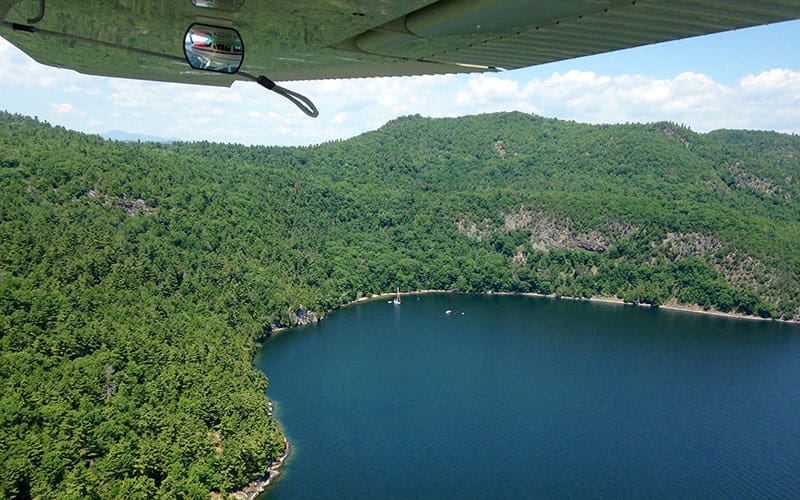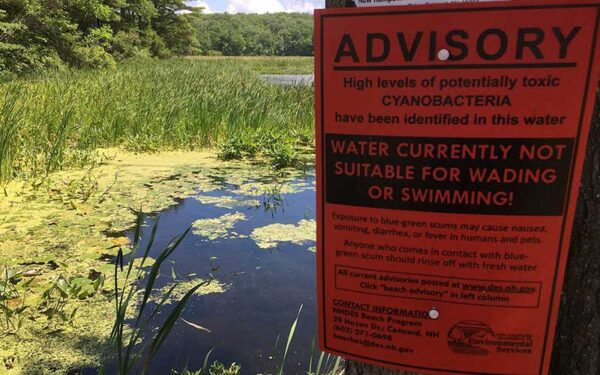
Vermont's legislature is debating how much money to invest in ongoing clean up efforts for Lake Champlain; but the costs of inaction are far greater. Photo: Lighthawk
Money has been a big part of the clean water conversation at the Vermont State House this year. In January, State Treasurer Beth Pearce put a price tag of $62 million per year for the next 20 years on the efforts needed to reach our clean water goals. A week later, Governor Phil Scott announced that he will be investing $25 million each year for the next two years toward meeting these clean water obligations.
These numbers may sound overwhelming, but the costs of inaction to our economy and to our health are even greater. But with your help, we can ensure our legislature provides the funds we need to make our waters healthy again.
We Can’t Afford Dirty Water
Tourism contributes $2.5 billion each year to Vermont’s economy, but our toxic waters and closed beaches each summer are harming business and turning away visitors. Families with houses along the shoreline are having a hard time selling their properties because of declining value. And countless jobs – from fishermen and restaurateurs to the recreation industry – depend on clean water. This doesn’t even begin to cover the health implications of polluted waterways and the 200,000 Vermonters who depend on Lake Champlain for their drinking water.
If we want a clean and healthy Lake Champlain – and all the personal, environmental, and economic benefits that go along with it – then we can’t afford not to invest in clean water. And that investment needs to start now.
Short-term Funding for a Long-term Effort
The state legislature is currently deciding whether or not to invest in clean water. So far, we’ve seen some appetite for Scott’s two-year, quick injection of funds to jumpstart the 20-year clean-up process. The $25 million per year would go toward managing polluted stormwater that runs off of roads and rooftops, putting up fences to keep livestock out of streams, and upgrading wastewater treatment facilities, among other conservation practices. This interim funding is important to help towns and farmers meet new pollution control requirements.
However, it is equally important to consider what happens after this initial two-year investment runs out, especially with federal funds for clean water at risk in President Trump’s proposed budget for the Environmental Protection Agency. Restoring Lake Champlain to health is going to take years. Vermonters are committed – but we need a long-term plan from our state leaders that shows they, too, are committed to seeing this effort through.
To push a long-term plan forward, CLF is spearheading a coalition of environmental, agricultural, municipal, and business organizations. Together, we are urging the legislature to act not just on the two-year funding investment, but also on the much-needed long-term funding plan. Click here and here to read more about this effort.
Take Action: Contact Your Legislators Today
The legislature needs to hear that short- and long-term funding is important to Vermonters. Please, call your legislator right now and ask that they ensure safe and healthy waters for Vermont in the years to come.
You can look up your legislator’s office number, or just leave a message for them by calling the Vermont State House Sergeant-at-Arms at: 802.828.2228
The Sergeant-at-Arms will ask where you live, and then will be able to deliver a message right into your Representative’s hands.
Here are a few talking points for your call:
- Please support both short-term and long-term funding for clean water this year. We need the legislature to fund cleaner water for Vermonters – because if they don’t, consumers, farmers, businesses, and families will be forced to bear the full cost alone.
- Vermonters must be able to drink, fish, swim, and paddle on waters that are safeguarded against contamination.
- Vermont has clean waters that need and deserve protection. Today, unfortunately, too much pollution is entering our waterways and fueling toxic algal blooms, closed beaches, decimated fish populations, and depressed property values.
- Our businesses depend on clean water, including businesses that rely on tourists who annually contribute $2.5 billion to our economy.
Clean water is fundamental to healthy communities and a thriving economy. We must invest in this resource now and over the long term. Thank you for taking action!




